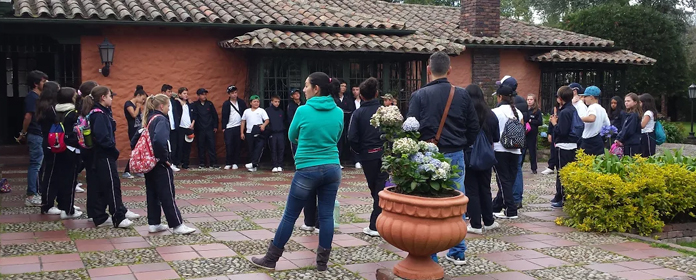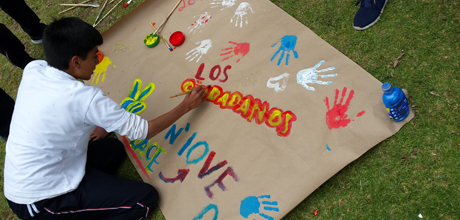Seven virtues for promoting character education in Latin America
Experts from a project led by the School of Education and Psychology and the Institute for Culture and Society (ICS) relate some of their experiences from field work in Argentina, Mexico and Colombia

FOTO: Cedida
Character education is necessary for all young people, regardless of their situation and socioeconomic status, according to experts from the “Researching and promoting character education in Latin American secondary schools” project, which they developed between 2016 and 2018. Working from within the School of Education and Psychology and the Institute for Culture and Society (ICS) of the University of Navarra, the project received funding from the Templeton World Charity Foundation.
During their research, they carried out field work focused on 12-13 year old students in schools in Argentina, Mexico and Colombia. The centers they chose covered very different features, for example, students with all kinds of socio-economic situations, sex-separated and mixed classrooms, public and private funding... There, researchers uncovered the difficulties that children and adolescents experience in their extra-curricular contexts and that make character education very important.

The researchers propose reinforcing education in the seven virtues described below. The international research community considers them to be universal and fundamental for the development of people and societies.
Strength / courage/ valor. is the ability to overcome difficulties that may arise when in pursuit of a goal.
During fieldwork in Latin America, the researchers found numerous cases of people who showed great courage in the face of their circumstances. They especially recall the case of a teenager from Colombia, who came from a difficult family with very few resources. His father had abandoned him, his mother was in and out of prison and he knew he was not wanted. Several custodians mistreated him, and he was on the verge of death several times due to various accidents... Despite his hardship, he has a very good academic record, obtained a scholarship and writes poetry. He confessed that, for him, school is "a break" that has given him the support to overcome his problems. His dream is to go to college.
Compassion means being aware of others’ needs and striving to help them.
The researchers highlight an initiative they found at high socio-economic Argentine high school. The school seeks to make students from well-off families aware of the needs around them and encourages them to help out. Thus, it has a program that promotes several activities, including visits to schools with fewer resources to promote values such as civic commitment and respect for diversity, to elderly people in a nursing home to promote a spirit of service and social solidarity, and to schools with deficiencies so that students reflect on the situation of people with fewer resources. They also saw another Argentine school launch an initiative that teaches students to value their life and that of others. Each class includes a “life education” project, for example, in “Ethics and civics,” they work on particular issues such as privacy on social networks, cyberbullying, sexting, etc.
Justice implies giving each person his or her due.
The project members highlighted an inclusive school in Colombia that welcomes children and young people rejected by other schools for bad behavior, low academic performance, cognitive disorders, etc. Students suffer from various types of problems—some of them go hungry in their homes, others are involved in drugs, others have disabilities—and the center breaks with traditional educational paradigms to meet students where they are. It uses three models: An accelerated model for those who dropped out and now need to catch up, a literacy model for children who do not know how to read or write, and another for young people and adults. The school has improved the lives of many children by covering their basic educational needs and fostering interpersonal relationships that help them integrate into society. It is an example of social justice that serves as a model for students and those around them.
Honesty consists in acting with rectitude, according to what one thinks is right.
The researchers mentioned a school in Mexico that experienced problems related to theft, from money to phones, in addition to smaller objects. Through a character education program, they underscored an array of virtues, one per month, among the entire school community. Since addressing honesty, teachers observe improved behavior with more lost items returned and fewer complaints of theft.
Self-discipline involves focusing the will and sacrificing to achieve a goal, whether immediate or long-term.
In most of the schools the researchers analyzed, they detected problems related to self-discipline, especially regarding the use of technologies and social networks, as well as the abuse of tobacco and alcohol, and drugs to a lesser extent. As an example of best practices, they highlight a school in Argentina that works on self-discipline to foster a culture of impulse control in favor of more harmonious classrooms. The school psychologist talks with the students and parents... They look for personality types, establish problem diagnoses and influence the reflection process that helps them grow in that virtue. They have also introduced sanction mechanisms and rules for coexistence, both for students and teachers. The center has put measures in place to encourage teachers to set a better example for students (punctuality, not selling things in the classroom).
Gratitude is about valuing the goods, benefits, gifts and favors that one receives from others.
The University of Navarra team found that students from Mexico, Colombia and Argentina have a very material sense of gratitude that is almost exclusively related to goods and objects. They recommend further education in the appreciation of other benefits received. With the aim of teaching students to value the intangible more, they propose promoting service-learning experiences (for example, encouraging students with higher academic performance to help students with lower performance one day a week). They believe that these practices can help improve gratitude towards immaterial things and can promote the recognition that others’ actions are not necessarily obligatory.
Humility / modesty means knowing and accepting the truth about oneself.
The researchers believe that encouraging spaces for self-reflection and problem analysis, as well as accepting shortcomings experienced in each context, are very fruitful ways for developing humility. One of the schools they visited in Argentina promotes meetings where students think about their daily behavior, how they can improve their relationship with people close to them, their weak points and their ability to overcome the difficulties they encounter.




